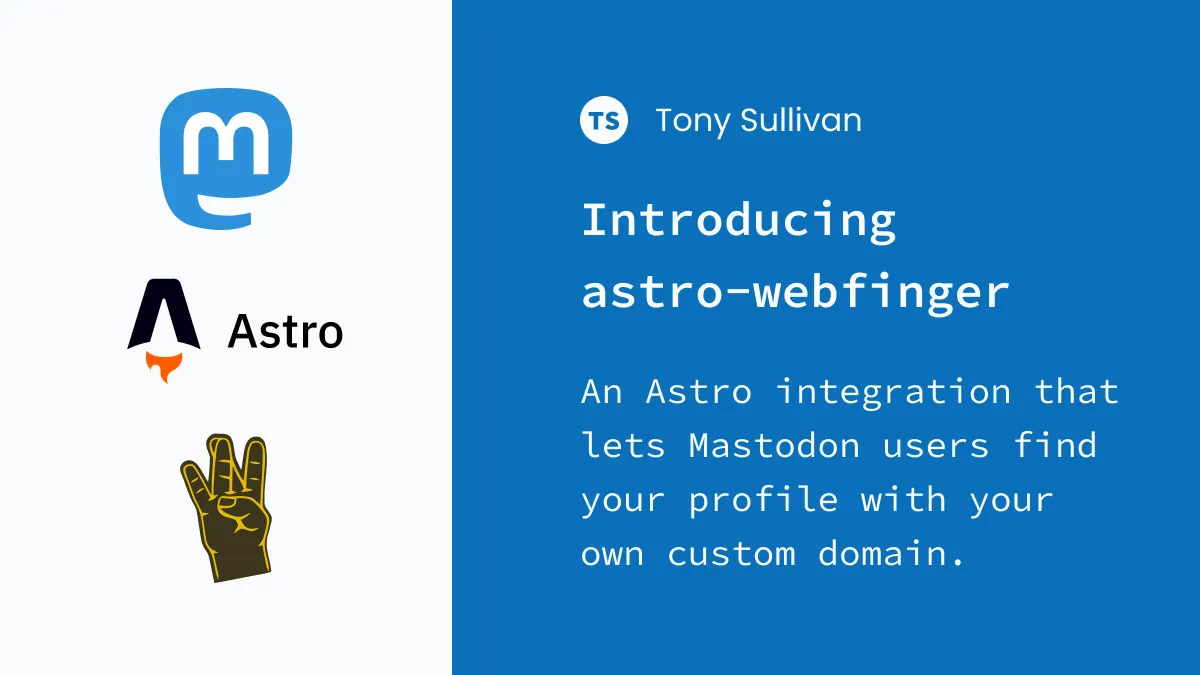Introducing astro-webfinger
4 min read
Integrating Mastodon profiles with Astro.
This is the first in a series of articles as I attempt to tie together concepts from the IndieWeb and ActivityPub to build a self-hosted social network. Subscribe to the RSS Feed for updates!
Mastodon has been in the spotlight recently, largely as a reaction to concerns over the future of Twitter. I’m still not sold on Mastodon as a protocol, or as a user experience for that matter, but it’s built on a collection of excellent protocols.
🌶️ Hot take 🌶️ I’m also not sold on federation as the right answer, or push-based designs in general. I can dive down that rabbit hole in a future article if you’re is interested!
tl;dr; Just looking for the code? I published astro-webfinger to make it easy to add Webfinger support to an Astro.
Step 1: The Webfinger Protocol
What exactly is Webfinger? Think of it as a way to add metadata to an email address. There’s a bit more to it, but for the sake of Mastodon support it’s just used as a way for one server to discover a Mastodon profile by email address.
How does it work?
When you search for a user’s profile on Mastodon you usually search for something similar to an email address, ex: you can find me on Mastodon by searching for tonysull@indieweb.social. Your Mastodon server sends a request to the indieweb.social server, specically to the .well-known/webfinger endpoint. For example, searching for my account will send a request to
indieweb.social/.well-known/webfinger?resource=acct:tonysull@indieweb.socialThe response will include metadata about my account like my profile’s homepage and the URL for reading a feed of my posts and activity.
Can we self-host it?
Running your own Mastodon instance is hard. There are a few services out there that will host a server for a small monthly fee, though as of now many of them are out of resources and aren’t accepting new customers.
Hopefully one day I’ll be writing about how to fully integrate my own site into Mastodon, but for now the Webfinger metadata is just a bit of JSON…lets self-host it!
Why? For one thing, self-hosting it now means that I can change Mastodon servers later without having to go back and fix any links to my profile that I’ve already published. @toot@tonysull.co will always link to my current Mastodon profile and will always be searchable, no matter how often I server-hop.
What we’ll need
I published the astro-webfinger integration to make it easy to add Webfinger support.
If you’re curious how to do this yourself I highly recommend Lindsay Wardell’s Integrate Mastodon with Astro post. It not only goes into details on writing your own Webfinger support, and even dives into using Mastodon APIs to pull your Mastodon activity back into your own site!
Setting up astro-webfinger
If you’ve worked with Astro integrations before this will feel very familiar.
Installation
# npm
npm i @astrojs/rss
# yarn
yarn add @astrojs/rss
# pnpm
pnpm i @astrojs/rssConfiguration
To configure this integration, pass a config object to the webfinger() function call in astro.config.mjs.
import webfinger from 'astro-webfinger'
export default defineConfig({
integrations: [
webfinger({
instance: 'myinstance.social',
username: 'myusername',
}),
],
})Deploy
That’s it! The integration will include a /.well-known/webfinger route to your build.
If you’re already using Server-Side Rendering (SSR) in your project it will also include the correct Content-Type header.
What’s next?
Currently, astro-webfinger will return your Mastodon profile regardless of the username that was actually searched. ex: search for fake@tonysull.co and you will still discover my Mastodon profile.
A future release of astro-webfinger will add an SSR mode that allows you to configure what usernames should be recognized in search results. This will also allow you to alias multiple Mastodon profiles from the your own domain.
